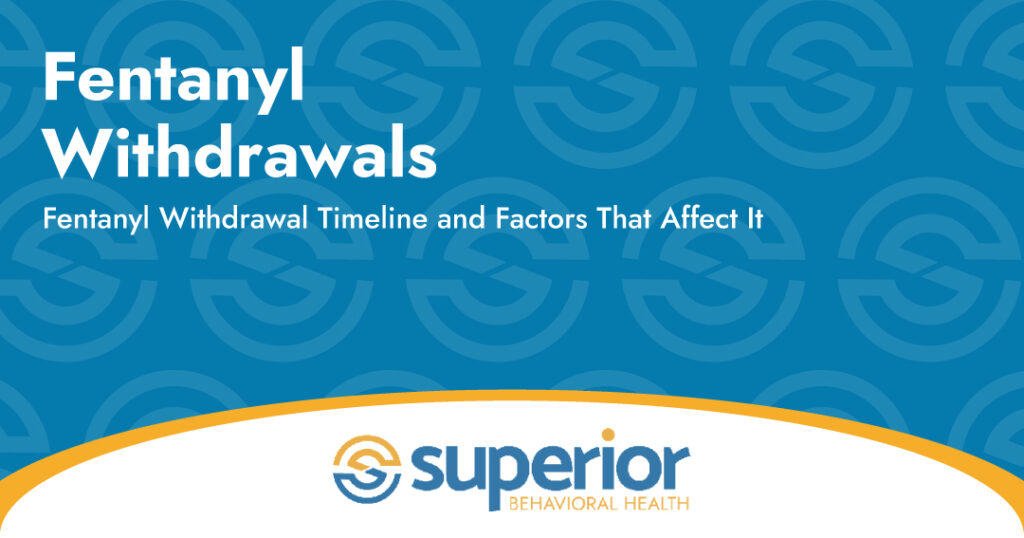A man had comfort in fentanyl, but he wanted more out of his life. He had seen others die from overdoses throughout the years, including his best friend. There were times when he tried to move on from fentanyl, but he could never make it past two days. The cravings, insomnia, and depression that he would get when he wasn’t taking fentanyl were too much. He felt stuck, as if fentanyl would always control his life.
In 2020, over 4,000 people died from fentanyl overdoses in Ohio. At Superior Behavioral Health, we don’t see hundreds of patients. We treat you as an individual as we help you achieve your dreams apart from fentanyl. The first step to this is always the hardest and involves fentanyl withdrawals. Today, we are going to discuss that process.
Fentanyl Withdrawal Symptoms
Fentanyl withdrawal is what someone will go through when they stop using fentanyl. It usually involves uncomfortable symptoms. They aren’t always dangerous, but they can if complications arise. You should always seek medical supervision when withdrawing from fentanyl because complications can occur, and it’s best to be monitored. These symptoms can encourage someone to want to return to use. However, they occur because the body and brain have become dependent on fentanyl. As it naturally removes the substance, the body craves more of it. These symptoms are temporary, and recovery is always possible despite how daunting the withdrawal phase can be.
Physical Symptoms of Fentanyl Withdrawal
There are several physical symptoms people undergoing fentanyl withdrawal might experience. However, every person will experience a different combination of symptoms and might not experience all of them. For example, someone might have low body temperature and sweating, while someone else might experience chills and high blood pressure. People might also have flu-like symptoms such as runny nose, nausea, vomiting, and diarrhea. Abdominal cramping and muscle aches are also common symptoms associated with fentanyl withdrawal.
Mental Symptoms of Fentanyl Withdrawal
Alongside physical symptoms, mental symptoms might also present themselves during fentanyl withdrawal. These might include depression and anxiety, but they can also have agitation or sleep problems. People might also experience dysphoria or confusion while undergoing fentanyl withdrawal. Receiving treatment and therapy can help relieve these symptoms.

Fentanyl Withdrawal Timeline and Factors That Affect It
Fentanyl withdrawal typically occurs in three phases. The first phase typically starts within 12 hours of your last use. The highest intensity of symptoms occurs in this phase, around 24-48 hours. These symptoms involve intense cravings, insomnia, and anxiety. The brain is trying to rebalance itself now that it doesn’t have fentanyl. This lack of fentanyl causes these intense, often uncomfortable symptoms.
The second phase occurs around 3 to 5 days after you have stopped using fentanyl. Your brain is starting to live without fentanyl but will still have symptoms such as chills and vomiting. Cravings might still exist, but you will notice that they are becoming less intense.
The third phase includes aches and pains, depression, and anxiety. This phase can last several weeks as the brain adjusts to life without fentanyl. Receiving fentanyl treatment can help make each of these phases easier to manage.
Post-acute Withdrawal Syndrome
Post-acute withdrawal syndrome, also known as PAWs, often lasts for weeks or months after someone has undergone withdrawal. People might have symptoms of depression, anxiety, and insomnia during this period. It can range in severity that can result from stressful circumstances, but might also show symptoms without stress. Often, it occurs because the brain has been handling stress with fentanyl, so when stress shows up again, it wants to return to use. Symptoms might include cravings for fentanyl, increased sensitivity to stress, and difficulty with memory recall. Continuing your treatment with a combination of medication and therapy helps make symptoms of post-acute withdrawal syndrome easier to manage.

Treatment Options Available for Fentanyl Use Disorder in Garfield Heights, OH
Superior Behavioral Health helps you reclaim your life from fentanyl use disorder. Our local company accepts same-day appointments, so that you can start your treatment today. For more information or to begin your recovery journey from fentanyl, call us today at 216-435-1110.
FAQs
What is the pharmacology of fentanyl?
Fentanyl is 50-100 times stronger than other opioid substances. It is excellent for helping people who have undergone surgery or are in cancer recovery regarding pain management.


